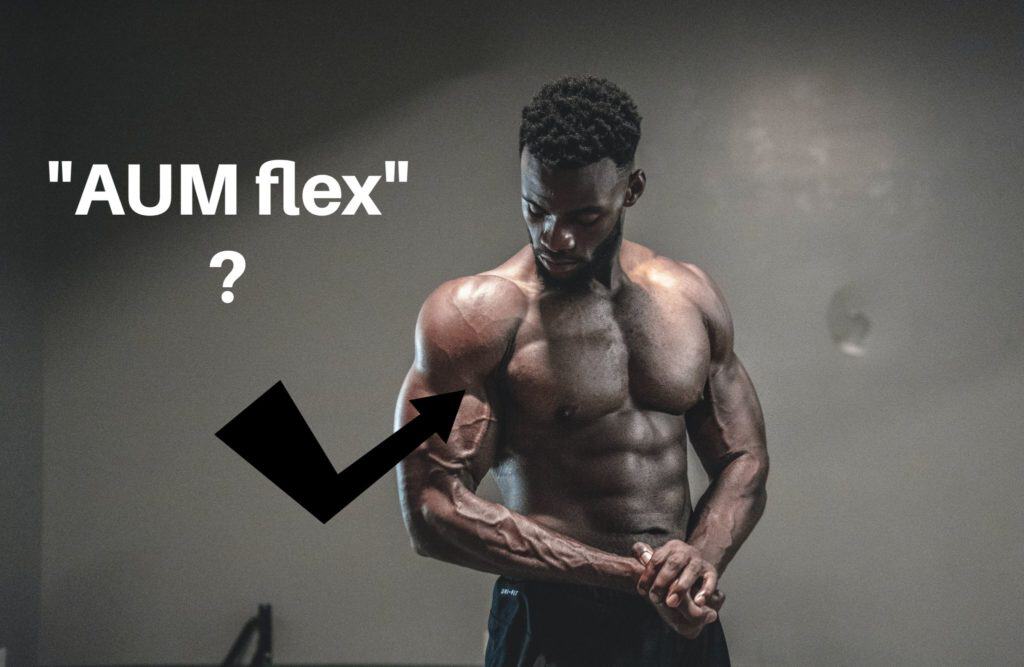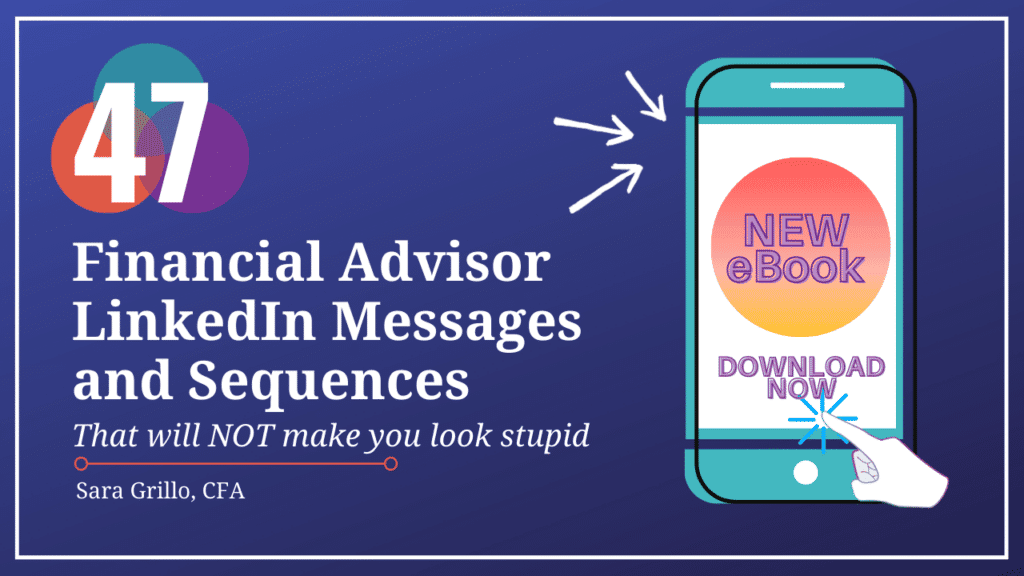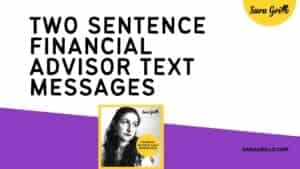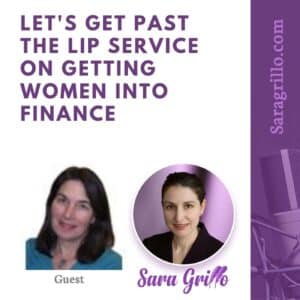Podcast: Play in new window | Download
This pod-blog is about how to get a killer financial advisor value proposition. I’m going to give you three examples of the value proposition a financial advisor could use, but first I’m going to talk about where you are probably messing it up.
For those of you who are new to my blog/podcast, my name is Sara. I am a CFA® charterholder and financial advisor marketing consultant. I have a weekly newsletter in which I talk about financial advisor lead generation topics which is best described as “fun and irreverent.” So please subscribe!

Why it’s so hard for financial advisors to articulate a value proposition
Here’s the real story about why it’s so hard to say your value.
Because y’all are listening to vendors too much.
Yup.
You know who I mean. The product pushers – the custodians, the software providers, the wholesalers with the million dollar marketing budgets. Those are some jargon heavy marketing brochures they send you. Too many technical words, too many marketing slogans, all of that. After a while you get used to talking like they talk because you bought their marketing pitch.
For a very long time, a financial advisor’s value was intrinsically tied to the following:
- How much AUM (asset under management) they had
- The products they sold
- Their investment performance
All of which are closely associated with products sold to you by vendors. Don’t just repitch their marketing pitch to your clients and call it your value proposition!
Don’t listen to them.
Listen to your clients instead.
Where financial advisors mess up the value proposition
See, here’s what all of you are missing.
The value proposition isn’t about you.
It’s about them.
Them not you
THEM NOT YOU
Them. not. you
Them, not you.
ThEm NoT yOu
-Sara G
Did I make the point?
So stop flexing about your AUM and start talking about the experience that people actually have as your client!

You have to define value from their point of view, not yours!
You drive a wedge in between yourself and the client when you say something like, “I’ve got the best performance in the industry. Send over your financial statements and ACAT the money, and let me do the work.” Separate, isolated, non-interactive. Not really working together, just me following your commands and you following mine.
See, here’s the thing. In a way it’s very insidious, because you are disempowering the client. In a sense you have de-involved them.
Plus, alot of you are saying that you have kicka&# performance. However in reality you don’t. And even if you did, you don’t have the audited track record to back it up because you all say that you don’t track performance due to inconsistencies between clients (hard to group into composites.)
Then the market crashes and then you’ve got people running like a bullet to the next advisor. Because they haven’t grown, they’ve been so detached from jump, and when the product doesn’t turn out to be what you said it was 100% of the time they aren’t interested.
Because you’ve defined your value this way!
Let’s look at a different framework of value.
Your value proposition = the emotions you create in your clients
What makes an experience valuable?
I had a tremendously valuable donation experience last month. I hate the suffering in Afghanistan and I donated to the IRC. A few weeks later, I got a phone call. An Afghan woman called me to personally thank me for helping her people. Then a few weeks after that I got an email with some Afghan recipes.
Unbelievable.
It went way beyond those return labels they usually send you. It’s not that I don’t appreciate having not having to write about my return address, but this made me feel:
- Like I was a part of them.
- Like I was part of their culture and their family, in a way.
- It was emotionally fulfilling to hear a woman speak with an Afghan accent. I have never directly had someone call me and speak with such an accent. It was new.
- I learned about Afghan cuisine. I had never seen the food before in that recipe.
- I felt special, like they were thinking about me. I donated to a bunch of other charities and nobody did that.
If I had to donate again, I’d donate to the IRC over any other charity. To put it bluntly, that was great value for my money donated because there was great value in that experience.
The growth framework
The best financial advisors are those who make it not about the papers and the balances but about the client’s personal growth. They don’t just change the client’s money, they change the client by making them grow – growing in knowledge, in mindset, exercising better behaviors. Not just learning, but almost as if they’ve been trained on how to behave.
That way no matter what way the market goes, college tuition rates go, life goes, no matter who lives or dies or gets sick or not, they feel more in control and as if they can make better decisions in response to whatever happens. It’s not what you do for them, the words on a piece of paper, the numbers in the account.
Here’s a little psychological hack.
It’s harder for people to devalue something they are a part of. The way that human psychology works, we naturally view something as more valuable if we are a part of it. If we feel we are a part of it, connected to it.
The service is a commodity; the feelings about the service are what make you valuable
Guess what.
Most of you don’t do anything that different. Either you use eMoney or MoneyGuidePro. Either you custody at Schwab or Fidelity. There are some outliers but for the most part, you are all doing the same thing.
So you have to reverse engineer this and focus on things from their point of consciousness. Remember “you, not them” like I said earlier?
If you want to answer the question of “what’s my value proposition?”, here are three examples of how you could do that. These could also be used as banking value proposition examples, or also value proposition examples for insurance agents.
Example #1: The learning value proposition
There is great value in an advisor who makes the client feel better informed.
Guess why this matters – here’s a hint. Most people wouldn’t need a financial advisor if they thought they could do it on their own. And why can’t they? They’re smart people, right?
Some are probably even smarter than you!
It’s not for a lack of knowledge – it’s behavioral bias that leads them to seek you out. Biases like confirmation bias, action bias, herd bias, anchor bias. All of the psychological tricks our mind plays on us that lead us to make bad decisions with money and investments.
Use this to justify your value as a financial advisor.
What knowledge can you give your clients, so they can behave better?
Take three steps to learn how to articulate that.
Step #1
Make a list of all the things that your clients learn from working with you. Get 50 specific things on the list.
Here’s a start:
- Clients learn to look out each year for the Social Security cost of living increase.
- Clients learn about what inflation is and how it impact them.
- Clients learn how tax treatment of small donations is changing under new tax law
See, because here you’re really getting at what the value is that you provide, but it’s from the standpoint of THEIR experience not yours.
You need 50 things on this list
If you don’t know 50 things, start asking your clients, “what have you learned by working with me?” Yes, you will have to work hard.
Step #2
Look at the list of 50, and pick out 1) the learning that applies most universally to the greatest number of clients and 2) the most powerful learning that any one client has had.
Step #3
Then say these words (fill it in with your personal results from #3).
Somebody says, “Why should I pay you $12k a year?”
You say:
“The most universal gain that my clients take away from working with me is the understanding of how their estate planning impacts their legacy. The best example of this was when a client was able to make a $5MM donation to a charity using gifting strategies they learned from me.”
#2 The humble value proposition
You have to be willing to give them permission to throw the relationship out the window. Because you take it and throw it out the window first. It takes the pressure off.
They say, “Why should I pay you $12k a year?”
Say these words:
“There are a lot of people who do what I do. Some of them say they’ll get you the best return. Some of them say they’ll save you the most taxes. Others say they have the best financial planning process.
I can’t say any of those things and believe it and I personally think those people are exaggerating anyway. My value isn’t as much about me and more about what my clients gain and the impact it has on their ability to make decisions in their daily lives. I will say is that my clients feel more comfortable with their money because I teach them how to make smarter decisions. I teach by example, and I teach through experiences and outcomes, and I teach through what I communicate to you with my words.”
Then you insert the part you said in the “learning value proposition.” (in #1 above)
#3 The simple value proposition
Brevity is rare in these types of financial advisor value proposition declarations because people get really nervous and ramble. If you can make a simple statement and then shut up, you just may win the client over.
Examples:
“I’ve come to save you from the backbreaking tax rates that you will slaughter you if you retire here in Manhattan and that is worth way more than $12k.”
“I’m here to be the easiest person in the world for you to communicate with about your money while you are busy being a neurosurgeon, and for that reason alone I am worth the $12k you will pay me this year.”
“I’m here to save you from being your own worst enemy because as we all know, our mind plays tricks on us with money sometimes.”
You can only say this when you’re sure you know who you’re talking to. This is not an elevator pitch, or the opening line of the meeting. It’s the summary line, kind of like the exclamation point that goes at the end of the meeting. Over the course of the meeting you’ll need to have listened to them to know what unique needs they may have – and that’s how you justify your value as their wealth manager.
What about a financial planner value proposition?
People don’t buy financial planning services on fluffy, feel good “mission statement stuff.” How do you describe financial planning so people feel it’s a ‘must have?’
Say this:
“I do math equations so people don’t mess up big financial decisions and permanently ruin their lives.”
Raw.
It doesn’t flow well, and it doesn’t even make grammatical sense.
But they’ll get what you mean, for sure.
This is hard work, no joke
Work hard to express your value. Yes, you will have to devote time and energy to figuring this out. But the alternative is sounding like everyone and else and that gets you nowhere.
Some of you may not actually be providing that much of value. You may not be giving to them other than the nuts and bolts of the service offering and hoping that they’re satisfied enough with the performance that they don’t ask too many questions.
If you are fighting with your clients, not getting enough referrals, fighting over fees or performance, you need to work on this. You need to work on communicating with them in a way that educates and trains them, because when they feel like they understand what is going on you they will see more value in you. Because then they’ll see why they can’t do it better and they wouldn’t want another advisor to do it better because you communicate with them better than anyone else.
If you are losing clients due to fees, performance, couldn’t get them to come to your meetings, you need to work on this.
You may have to learn a few things from other advisors. But most of all, you’ll learn it from your clients because it is in the experience they have that is where the value lies (or not).
Sara’s upshot on the financial advisor value proposition
What’d ya think? Was this helpful?
If yes…
Learn what to say to prospects on social media messenger apps without sounding like a washing machine salesperson. This e-book contains 47 financial advisor LinkedIn messages, sequences, and scripts, and they are all two sentences or less.

You could also consider my financial advisor social media membership which teaches financial advisors how to get new clients and leads from LinkedIn.

Thanks for reading. I hope you’ll at least join my weekly newsletter about financial advisor lead generation.
See you in the next one!
-Sara G
Music is Nice to You by the Vibe Tracks





